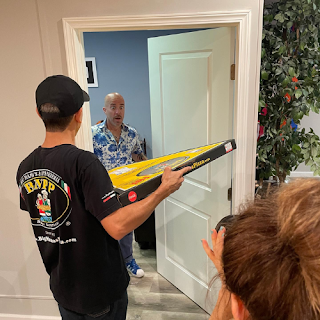Food Delivery: Bridging the Gap between Kitchens and Homes
In the ever-evolving culinary landscape, food delivery stands out as a transformative innovation that has reshaped our dining experiences. Gone are the days when eating from a restaurant meant physically visiting it. With the click of a button, a world of culinary delights can now come to our doorstep. Let's explore this phenomenon.
Historical Glimpse: The Humble Beginnings of Food Delivery
The concept of delivering food is not entirely a product of modernity. Its roots trace back further than many realize.
Local Vendors and Door-to-Door Deliveries
In ancient times, vendors in many cultures would traverse local neighborhoods, delivering fresh produce, dairy, and other staples. It was a time when the community connection was strong, and the food's journey was short.
The Pizza Paradigm
Fast forward to the 20th century, pizza delivery emerged as a game-changer. Establishments like Domino's paved the way for a delivery-centric business model that many eateries would soon adopt.
The Digital Revolution: Apps and Aggregators
As technology advanced, the food delivery scene underwent dramatic changes. The digital era introduced us to platforms that could connect multiple restaurants to countless consumers.
Ordering Made Easy
Through user-friendly interfaces, customers could now browse various menus, compare prices, and make an informed choice. The order's progress, from preparation to delivery, could be tracked in real-time.
The Rise of Aggregators
Companies like UberEats, DoorDash, and Grubhub emerged as aggregators, partnering with a multitude of restaurants. This allowed even small establishments without a delivery system to reach a wider audience.
Beyond Food: Delivering Experiences
Modern food delivery is not just about satiating hunger; it's about delivering a comprehensive dining experience.
Specialized Packaging
To ensure food reaches customers in the best possible state, restaurants have invested in specialized packaging. This maintains the food's temperature and texture, ensuring a restaurant-quality experience at home.
Incorporating Feedback
Interactive platforms allow customers to leave reviews and feedback. This two-way communication channel helps restaurants refine their offerings and service quality.
Challenges in the Food Delivery Landscape
Despite its booming popularity, food delivery is not without challenges. From logistical issues to environmental concerns, the industry is grappling with several considerations.
Sustainability Concerns
The increased demand for delivery means more packaging waste. Sustainable, biodegradable packaging solutions are now becoming imperative to reduce the environmental footprint.
Ensuring Fair Practices
The well-being of delivery personnel, often working in demanding conditions, has come to the forefront. Fair wages, job security, and proper working conditions are areas that need continuous focus and improvement.
Conclusion: The Evolving World of Food Delivery
The journey of food delivery, from local vendors to sophisticated digital platforms, reflects our changing lifestyles and needs. As the industry continues to grow, it carries the responsibility of not just feeding mouths but also addressing larger socio-environmental issues. As consumers, embracing these changes and being cognizant of our choices can make food delivery a more enriching and sustainable experience for all.

.png)

Comments
Post a Comment